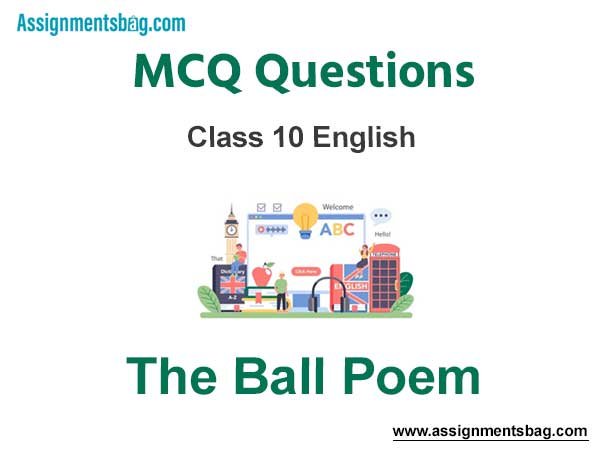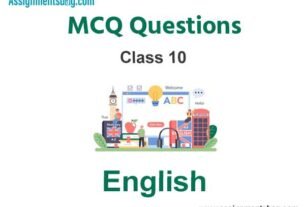Please refer to MCQ Questions Chapter 3 The Ball Poem Class 10 English with answers provided below. These multiple-choice questions have been developed based on the latest NCERT book for class 10 English issued for the current academic year. We have provided MCQ Questions for Class 10 English for all chapters on our website. Students should learn the objective based questions for Chapter 3 The Ball Poem in Class 10 English provided below to get more marks in exams.
Chapter 3 The Ball Poem MCQ Questions
Please refer to the following Chapter 3 The Ball Poem MCQ Questions Class 10 English with solutions for all important topics in the chapter.
MCQ Questions Answers for Chapter 3 The Ball Poem Class 10 English
I saw it go
Merrily bouncing, down the street, and then
Merrily over — there it is in the water!
No use to say ‘O there are other balls’:
An ultimate shaking grief fixes the boy
As he stands rigid, trembling, staring down
All his young days into the harbour where
His ball went
Question. The word that DOES NOT indicate a physical manifestation of sorrow in the boy, is
(i) worthless
(ii) shaking
(iii) trembling
(iv) rigid
Answer
(i)
Question. The poet feels that there is no point consoling the boy as
(i) it would give him false hope
(ii) he might demand for a new ball
(iii) it might distress him further
(iv) whatever he has lost is irretrievable
Answer
(iv)
Question. ‘Merrily over — there it is in the water!’ The dash here is meant to convey
(i) some familiar experience
(ii) a feeling of excitement
(iii) a sense of unexpected interruption
(iv) some thoughtful moments
Answer
(iii)
Question. The poet uses the ball as a symbol of the boy’s
(i) sense of adventure
(ii) carefree childhood days
(iii) ability to bounce back
(iv) extended family
Answer
(ii)
Question. The word ‘harbour’ DOES NOT have a meaning similar to
(i) port
(ii) pier
(iii) dock
(iv) cargo
Answer
(iv)
His ball went. I would not intrude on him,
A dime, another ball, is worthless. Now
He senses first responsibility
In a world of possessions. People will take balls,
Balls will be lost always, little boy,
And no one buys a ball back. Money is external.
Question. Does the poet console the boy?
(i) Yes
(ii) No
(iii) Can’t say
(iv) The boy consoles the poet
Answer
(ii)
Question. Give antonym for the word ‘intrude’.
(i) interfere
(ii) invade
(iii) withdraw
(iv) disturb
Answer
(iii)
Question. Name the literary device used in “And no one buys a ball back.”
(i) Metaphor
(ii) Simile
(iii) Anaphora
(iv) Alliteration
Answer
(iv)
Question. What does a ball cost?
(i) 5 dimes
(ii) 1 dime
(iii) 10 dimes
(iv) 7 dimes
Answer
(ii)
Question. According to the poet, what is the child learning?
(i) to bear loss
(ii) to take care of things
(iii) to be careful
(iv) to not be sad
Answer
(i)



